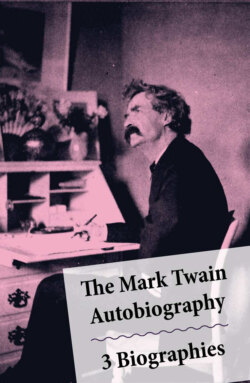Читать книгу The Mark Twain Autobiography + 3 Biographies - Mark Twain - Страница 62
На сайте Литреса книга снята с продажи.
XXIV.
ОглавлениеTable of Contents
To the period of Clemens’s residence in Fifth Avenue belongs his efflorescence in white serge. He was always rather aggressively indifferent about dress, and at a very early date in our acquaintance Aldrich and I attempted his reform by clubbing to buy him a cravat. But he would not put away his stiff little black bow, and until he imagined the suit of white serge, he wore always a suit of black serge, truly deplorable in the cut of the sagging frock. After his measure had once been taken he refused to make his clothes the occasion of personal interviews with his tailor; he sent the stuff by the kind elderly woman who had been in the service of the family from the earliest days of his marriage, and accepted the result without criticism. But the white serge was an inspiration which few men would have had the courage to act upon. The first time I saw him wear it was at the authors’ hearing before the Congressional Committee on Copyright in Washington. Nothing could have been more dramatic than the gesture with which he flung off his long loose overcoat, and stood forth in white from his feet to the crown of his silvery head. It was a magnificent coup, and he dearly loved a coup; but the magnificent speech which he made, tearing to shreds the venerable farrago of nonsense about nonproperty in ideas which had formed the basis of all copyright legislation, made you forget even his spectacularity.
It is well known how proud he was of his Oxford gown, not merely because it symbolized the honor in which he was held by the highest literary body in the world, but because it was so rich and so beautiful. The red and the lavender of the cloth flattered his eyes as the silken black of the same degree of Doctor of Letters, given him years before at Yale, could not do. His frank, defiant happiness in it, mixed with a due sense of burlesque, was something that those lacking his poet-soul could never imagine; they accounted it vain, weak; but that would not have mattered to him if he had known it. In his London sojourn he had formed the top-hat habit, and for a while he lounged splendidly up and down Fifth Avenue in that society emblem; but he seemed to tire of it, and to return kindly to the soft hat of his Southwestern tradition.
He disliked clubs; I don’t know whether he belonged to any in New York, but I never met him in one. As I have told, he himself had formed the Human Race Club, but as he never could get it together it hardly counted. There was to have been a meeting of it the time of my only visit to Stormfield in April of last year; but of three who were to have come I alone came. We got on very well without the absentees, after finding them in the wrong, as usual, and the visit was like those I used to have with him so many years before in Hartford, but there was not the old ferment of subjects. Many things had been discussed and put away for good, but we had our old fondness for nature and for each other, who were so differently parts of it. He showed his absolute content with his house, and that was the greater pleasure for me because it was my son who designed it. The architect had been so fortunate as to be able to plan it where a natural avenue of savins, the closeknit, slender, cypress-like cedars of New England, led away from the rear of the villa to the little level of a pergola, meant some day to be wreathed and roofed with vines. But in the early spring days all the landscape was in the beautiful nakedness of the northern winter. It opened in the surpassing loveliness of wooded and meadowed uplands, under skies that were the first days blue, and the last gray over a rainy and then a snowy floor. We walked up and down, up and down, between the villa terrace and the pergola, and talked with the melancholy amusement, the sad tolerance of age for the sort of men and things that used to excite us or enrage us; now we were far past turbulence or anger. Once we took a walk together across the yellow pastures to a chasmal creek on his grounds, where the ice still knit the clayey banks together like crystal mosses; and the stream far down clashed through and over the stones and the shards of ice. Clemens pointed out the scenery he had bought to give himself elbowroom, and showed me the lot he was going to have me build on. The next day we came again with the geologist he had asked up to Stormfield to analyze its rocks. Truly he loved the place, though he had been so weary of change and so indifferent to it that he never saw it till he came to live in it. He left it all to the architect whom he had known from a child in the intimacy which bound our families together, though we bodily lived far enough apart. I loved his little ones and he was sweet to mine and was their delighted-in and wondered-at friend. Once and once again, and yet again and again, the black shadow that shall never be lifted where it falls, fell in his house and in mine, during the forty years and more that we were friends, and endeared us the more to each other.
